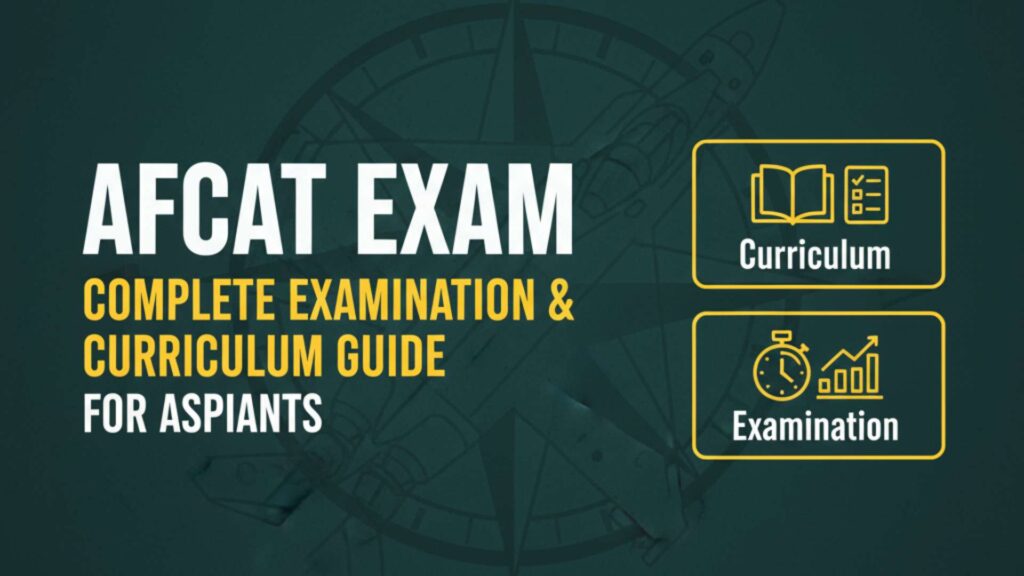The Indian Air Force (IAF) conducts the AFCAT (Air Force Common Admission Test) as a national-level competitive exam to recruit officers for various branches, including the Flying Branch, Ground Duty (Technical), and Ground Duty (Non-Technical). Here’s a complete guide to the AFCAT examination and curriculum for aspirants:
AFCAT Exam Pattern
The exam pattern of the AFCAT is as follows:
- Exam Mode: Online
- Exam Duration: 2 hours (120 minutes)
- Exam Language: English
- Number of Questions: The total number of questions in the exam is 100.
- Marking Scheme: Each question carries three marks, and there is a negative marking of one mark for each incorrect answer.
- Type of Questions: The questions in the exam are of objective type (multiple-choice questions).
The following is the breakdown of questions across sections:
- General Knowledge: 20 questions
- English Verbal Ability: 30 questions
- Numerical Ability: 15 questions
- Reasoning & Military Aptitude: 35 questions
AFCAT Exam Syllabus
The AFCAT syllabus covers a range of topics that candidates should be well-versed in to score well in the exam. The following are the subjects covered in the syllabus:
- General Knowledge: Geography, History, Environment, Basic Science, Defence, Art, Current Affairs, Culture, Politics, Sports, Civics, etc.
- Verbal Ability in English: Error Detection, Comprehension, Synonyms, Antonyms, Sentence Completion, and Testing of Vocabulary.
- Numerical Ability: Simplification, Decimal Fraction, Average, Profit & loss, Percentage, Ratio & Proportion and Simple interest.
- Reasoning & Military Aptitude: Verbal and Spatial skills.
AFCAT Exam Eligibility
AFCAT Educational Qualification
The educational qualification required for AFCAT exam varies depending on the branch that a candidate is applying for. The details are as follows:
- Flying Branch: Candidates should have a minimum of 60% marks each in Mathematics and Physics at 10+2 level and a Bachelor’s Degree with a minimum of 60% marks. OR, Candidates must have a B.E./B.Tech. degree (4-year course) with a minimum grade point average of 60%.
- Ground Duty (Technical) Branch: Candidates should have a minimum of 60% marks each in Mathematics and Physics at 10+2 level and a minimum of four-year graduation degree in engineering/technology. OR, Candidates must have a minimum of 60% in the Aeronautical Society of India’s Section A and Section B examinations or Associate Membership in the Institute of Engineers (India).
- Ground Duty (Non-Technical) Branch: Candidates should have a minimum of 60% marks in graduation in any discipline. OR, Candidates must have a minimum of 60% in the Aeronautical Society of India’s Section A and Section B examinations or Associate Membership in the Institute of Engineers (India).
- Age limit for Flying Branch is 20-24 years, and for Ground Duty (Technical/Non-Technical) is 20-26 years.
Note: Candidates who are in their final year of graduation or have completed their graduation are also eligible to apply for the AFCAT exam. However, they must have completed their degree course before the date of commencement of training.
Physical Eligibility for the AFCAT Exam:
- For Men: The Flying branch requires a minimum height of 162.5 cm, whereas the Ground Duty branch requires a minimum height of 157.5 cm. The weight should be proportionate to the candidate’s height and age.
- For Women: The Ground Duty branch has a minimum height requirement of 152 cm, whereas the Flying branch has a minimum height requirement of 162.5 cm. The weight should be proportionate to the candidate’s height and age.
AFCAT Exam Selection Process
The selection process for AFCAT consists of a written exam, followed by an Air Force Selection Board (AFSB) interview. Candidates who clear the written exam will be called for the AFSB interview, which includes a series of tests such as Psychological Tests, Group Tests, and Interview.
AFCAT Exam Admit Card
The AFCAT Admit Card will be available for download on the official website of the Indian Air Force (IAF). Candidates should carry the admit card to the exam center along with a valid photo ID proof.
AFCAT Exam Result
The Indian Air Force (IAF) will make the AFCAT Exam Results public on its official website. Those candidates who pass the written exam will receive an invitation to the AFSB interview.
AFCAT Exam Preparation Tips
Preparing for the AFCAT exam requires a well-planned strategy and consistent efforts. Here are some tips that can help you in your preparation:
- Understand the Exam Pattern: Before starting your preparation, it is important to understand the exam pattern and syllabus. This will help you to create a study plan and allocate time to different topics accordingly.
- Plan Your Preparation: Make a study plan and set realistic targets for yourself. Divide your time between different sections and topics based on your strengths and weaknesses.
- Study from Authentic Sources: Use authentic study material and books recommended by experts. This will help you to cover all the important topics and concepts.
- Practice Mock Tests: Practice mock tests regularly to get familiar with the exam pattern and to improve your speed and accuracy. This will also assist you in determining your strengths and shortcomings.
- Focus on General Awareness: The General Awareness section can be a game-changer in the AFCAT exam. Stay updated with current affairs, read newspapers, and watch news channels to improve your knowledge in this section.
- Improve Your English Language Skills: English language skills are essential for the Verbal Ability section. Read newspapers, novels, and practice grammar and vocabulary regularly.
- Solve Previous Year Question Papers: Solving previous year question papers will help you to understand the type of questions asked in the exam and to analyze your performance.
- Stay Motivated: Stay motivated throughout your preparation and keep reminding yourself of your goals. Take breaks, exercise, and indulge in hobbies to reduce stress and stay focused.
- Seek Guidance: Seek guidance from experts, mentors, or seniors who have cracked the exam. They can provide you with valuable insights and tips to improve your preparation.
In conclusion, the AFCAT examination is a highly competitive exam that requires rigorous preparation and dedication. Candidates should have a thorough understanding of the exam pattern, syllabus and selection process, and must practice regularly to improve their chances of success.





























